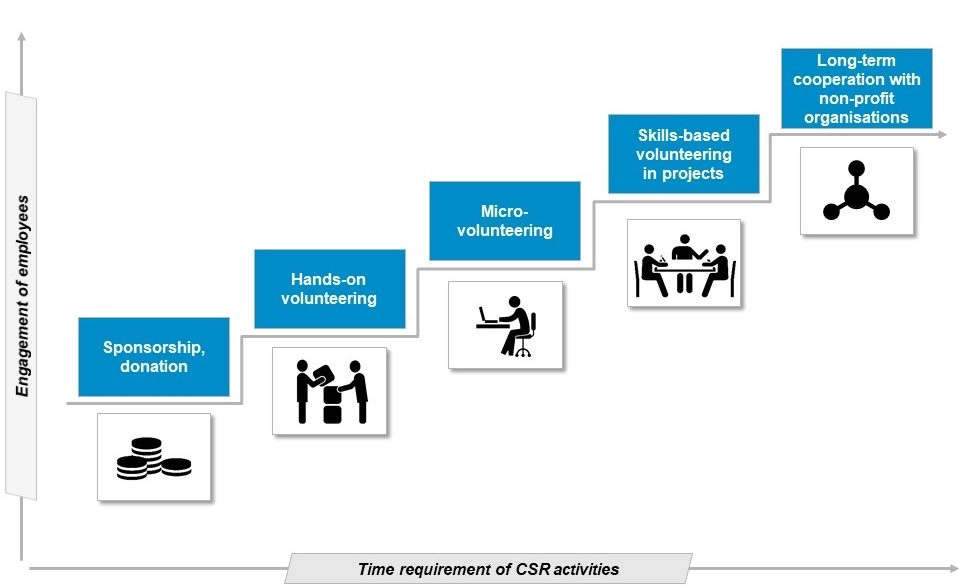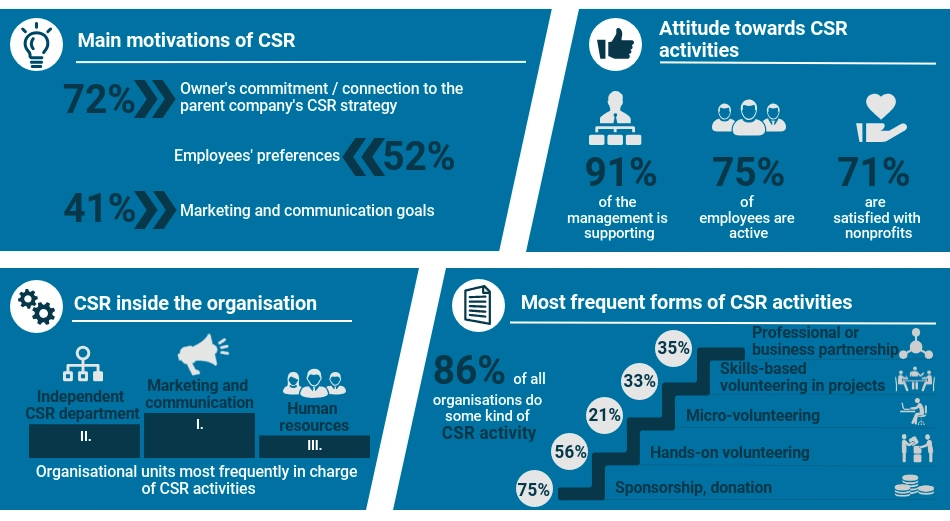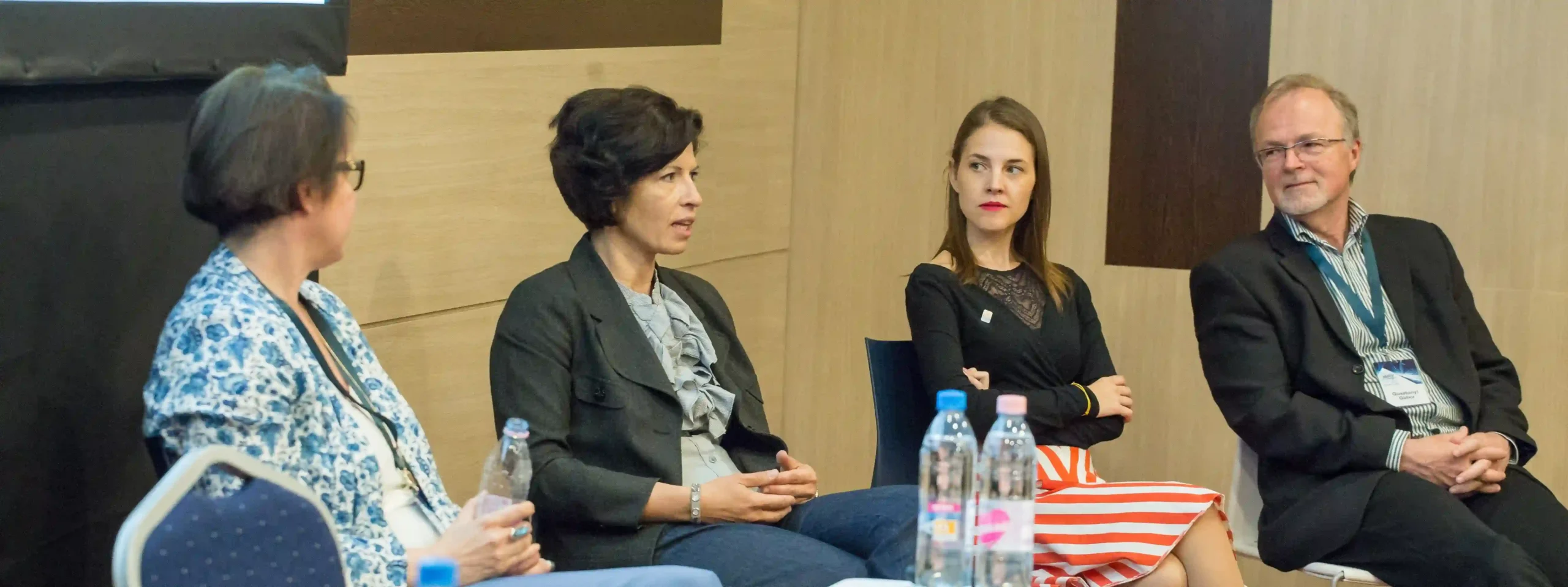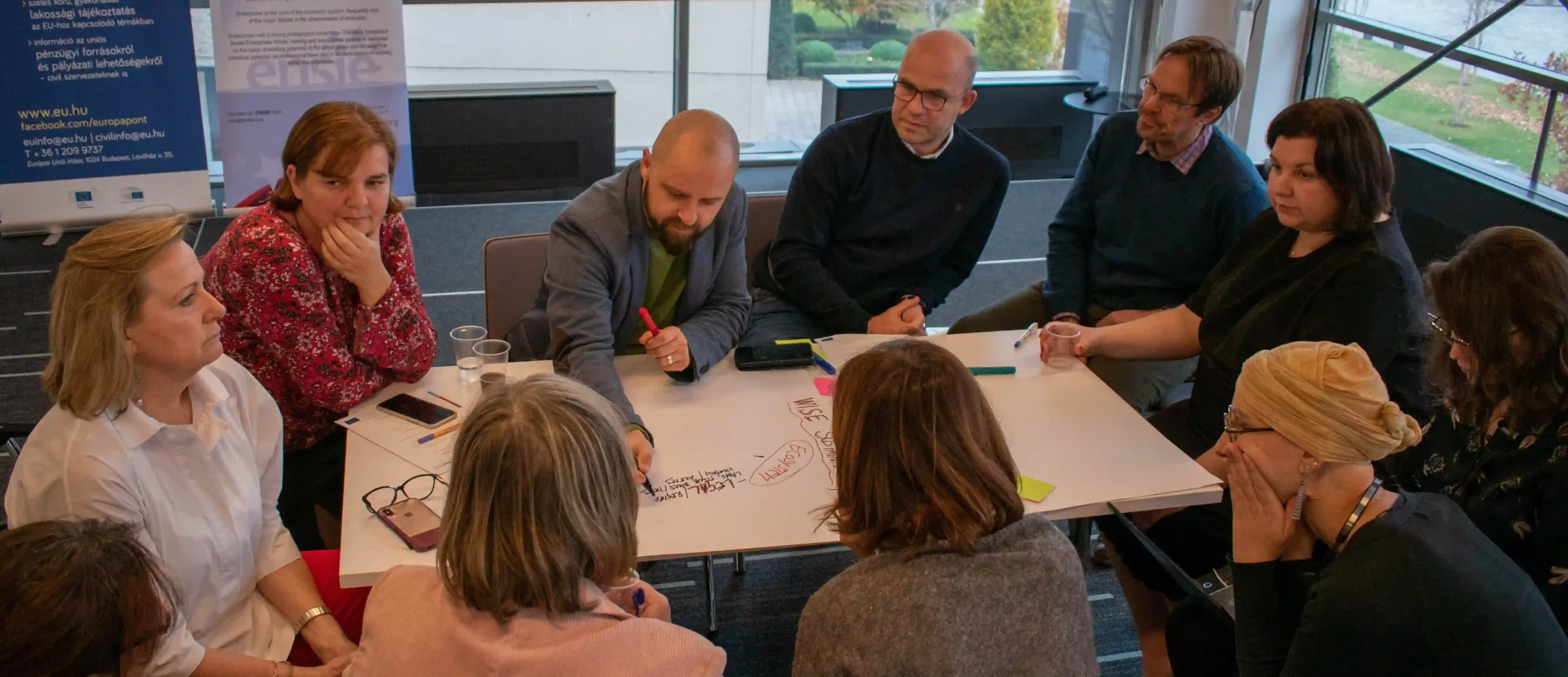Authors: Boglárka Dőry, Dóra Harsányi, Katalin Porubcsánszki (IFUA Nonprofit Partner Public Benefit Non-profit Private Ltd.)
Data visualization: Alex Lajtos (IFUA Horváth & Partners)
Key results of the survey*
- Corporate social responsibility (CSR) programs in Hungary are usually implemented when initiated by the shareholders, independent of the nationality (whether foreign-owned or Hungarian-owned).
- While the second most important driver for CSR in foreign-owned corporations is the need coming from employees, with Hungarian ownership it is the enhancement of company reputation.
- Foreign-owned corporations are better organized and more innovative with their CSR programs than their Hungarian counterparts, though the latters are becoming more active as well.
- The traditional forms of CSR – sponsorship, hands-on volunteering – remain the most popular.
- Foreign-owned corporations are more open towards new forms of CSR, such as skills-based volunteering in projects, and are more likely to establish long-term partnerships with nonprofit organizations.
- In corporations where CSR is formally appointed to a department, CSR strategy is prepared and hence results are communicated. On the contrary, in corporations without a department responsible for CSR issues, CSR activity is limited.
- CSR activities are usually well received and supported by the management and employees.
- Based on the results of the survey, several strong recommendations can be formulated for both for-profit and non-profit organizations regarding the implementation of CSR activities.
*Description of the survey is to be found at the end of the article.
The most important driver for the implementation of a CSR program is the dedication of the shareholders
1/3 of survey respondents marked dedication of the shareholders / compliance with the strategy of the parent company as the main reason for CSR activities. In foreign-owned corporations, the second most frequent answer was the preference of the employees (30%), while in Hungarian companies it was the use of CSR for marketing purposes (22%). Interestingly, in Hungarian companies, not only are shareholders the greatest motivation for the implementation of a CSR program, but their preferences also determined the content of it. This finding can be explained by the greater decision-making room of the leadership in SMEs and by the survey sample, as respondent SMEs were rather Hungarian-owned than foreign-owned.
Positive attitudes towards CSR activities
Generally, positive attitudes towards CSR activities can be assessed in both foreign-owned and Hungarian corporations, nevertheless CSR programs enjoy higher employee support in foreign-owned corporations. Furthermore, foreign-owned corporations are more satisfied with partnerships established with non-profit organizations. Independent of the nationality of shareholders, larger companies – above 250 employees – evaluate these partnerships as more satisfactory. In addition, employees in corporations with skills-based volunteering opportunities in projects are more active and better engaged in CSR activities.
There is a relationship between a formal CSR strategy, the organizational embeddedness of CSR activities and their communication
2/3 of the respondents have appointed an organizational department as responsible for CSR activities, but fewer corporations have a dedicated CSR department: 25% in foreign-owned and 9% in Hungarian corporations. A CSR strategy is always created when a dedicated CSR department is responsible for it, however, CSR activities are limited when no department is appointed for it. More foreign-owned companies than Hungarian ones, have a CSR strategy and they also put more emphasis on the communication of CSR activities – these results are independent of the company size. Furthermore, there is a gap between companies located in Budapest and the countryside of Hungary regarding the CSR strategy-formulation and communication. Additionally, corporations with higher share of white-collar workers are more likely to engage in CSR activities than those with rather blue-collar workers.
https://public.tableau.com/views/IFUACSRPublication_HU/CSRtevkenysgekszervezetibegyazottsga
Organizations are open towards innovative, more engaging CSR activities
83% of respondents do CSR activities of some sort, mainly still sponsorship and donations (75%), hands-on volunteering (56%). Companies with a CSR strategy are implementing new, more engaging forms of CSR activities, such as employment of people with disabilities and skills-based volunteering in projects. Regarding future development plans, Hungarian companies intend to strengthen – besides traditional types of volunteering – skills-based volunteering and micro-volunteering activities, while foreign-owned companies plan to establish long-term partnerships. Moreover, companies with higher share of white-collar workers tend to have in place or consider more innovative CSR practices and thus exploit their positive impact on employer branding and employee motivation.
What do the results tell profit-oriented and not-for-profit organizations?
Based on the results of the survey, valuable messages can be formulated for non-profit as well as for-profit organizations regarding CSR activities:
Recommendations for profit-oriented corporations:
- When developing a CSR strategy, an organizational department should be appointed to take responsibility for the implementation of CSR activities (this could be a new, dedicated CSR department as well as an existing other department).
- The scope and the objectives of the CSR activities should be determined parallelly (retaining employees, supporting HR strategy, enhancing a positive corporate image, etc.)
- Formalized organizational support plays an essential role in enabling employees to do volunteer work. A framework and guidelines should be developed for the CSR activities, more specifically, those conditions should be established that give employees the possibility to volunteer during their office hours.
- CSR activities should be communicated both internally and externally.
- The possibilities, results, as well as personal benefits of CSR activities should be communicated towards employees (professional development, development of leadership skills).
- Externally, the results of the CSR activities should be communicated in a credible way, given that they can improve the corporate image and employer brand, thus resulting in HR and PR benefits.
- Beyond traditional CSR activities (sponsorship, donations, hands-on volunteering), there are great opportunities for more innovative CSR practices (micro-volunteering, project-based volunteering, professional or business partnerships, employment of people with disabilities).
- These opportunities are more motivating and engaging for employees, HR benefits can be exploited.
- These activities also create greater value for non-profit organizations, because they gain access to such expert support, which can improve their operations.
- Shareholder commitment is key to the launch and success to CSR activities.
- As volunteering is exceptionally motivating for employees, they should be consulted about the focus of the CSR activities as early as the planning phase, and through employee involvement, HR benefits will be sustained in the long run.
- Grassroot initiatives and recommendations also contribute to the establishment of non-profit partnerships.
Recommendations for non-profit organizations:
- Corporate segments with great room for implementing and formalizing CSR activities can be identified (strategy, dedicated corporate department, communication). These are the SMEs, those companies with headquarters in the countryside of Hungary and Hungarian-owned companies in general.
- Corporations usually don’t develop their CSR activities based on the requests of non-profit organizations, they rather include these as inputs into their CSR activities.
- In case of SMEs, the leader of the organization should be convinced about the importance of the collaboration, because decisions regarding CSR activities are usually made by him/her.
In case of larger corporations, the dedicated CSR department should be addressed (if there is one), besides the HR and marketing departments. Information about the company’s CSR strategy should be collected in advance, as well as about the types of organizations and partnerships they possibly collaborate with. This is important, as a good fit into the company’s profile and CSR strategy is a key success factor for a fruitful collaboration.
About the survey
IFUA Nonprofit Partner conducted a survey about the CSR practices of companies operating in Hungary between July and September of 2019. The aim of the survey was to explore the corporate social responsibility practices of companies operating in Hungary, as well as to inspire the respondents for further development and expansion of these activities. Based on the results of the survey, the tendencies of CSR activities can be understood, and recommendations can be developed for both profit-oriented corporations interested in CSR and non-profit organizations.
We defined CSR activities as a broad term, their possible forms can be seen on the figure below:

For more details, please visit: Corporate volunteering: an efficient tool for employee retention.
The CSR survey counted 65 corporate respondents
65 companies took part in the survey. The share of SMEs and large corporations was about 1:1, similar to that of Hungarian and foreign-owned companies.
The most respondents are head-quartered in Budapest, have a high number of employees, who are mainly white-collar workers. In terms of industry classification, most respondents come from the financial and insurance (15%), commerce and automotive manufacturing (12%), information and communication (9%) and other service providing (11%) sectors.



